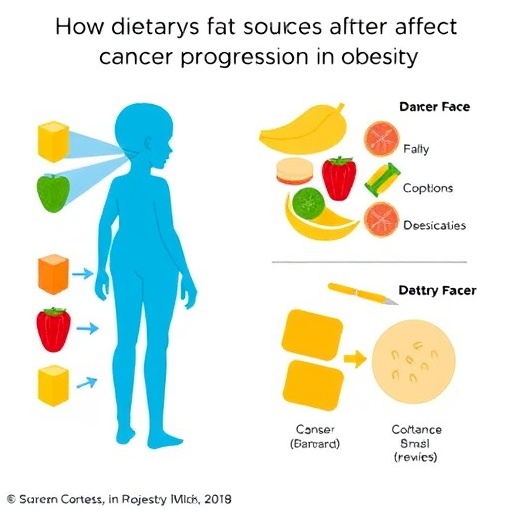
Obesity is a well-established risk factor for multiple types of cancer, implicated in at least thirteen significant malignancies including breast, colon, and liver cancers. Beyond its direct association with increased cancer incidence, obesity also impairs the body’s immune system, especially the components that are crucial for recognizing and eradicating cancer cells. Immunotherapies designed to stimulate immune responses against tumors often lose effectiveness in individuals with obesity, raising an urgent question within cancer research: Is it the sheer volume of adipose tissue or the specific dietary fats consumed by these individuals that primarily compromises anti-tumor immunity?
This question has been meticulously addressed in a groundbreaking decade-long study led by Lydia Lynch, a prominent researcher at Ludwig Princeton, and recently published in Nature Metabolism. The research team conducted extensive investigations to disentangle the impact of dietary fat sources from total fat mass on tumor progression and immune competence within the context of obesity. Their findings provide compelling evidence that the source of fat in the diet—not the quantity of adiposity per se—is the dominant driver influencing tumor growth and immune suppression in obese models.
Lynch elucidates that obese mice fed high-fat diets derived from animal fats such as lard, beef tallow, and butter exhibited marked suppression of anti-tumor immune responses. These fats impeded the function of key immune cells, notably cytotoxic T lymphocytes (CTLs) and natural killer (NK) cells, which are responsible for mounting cytotoxic attacks against tumor cells. In sharp contrast, equally obese mice maintained on diets rich in plant-based fats—like those from coconut oil, palm oil, or olive oil—did not experience this immune dysfunction or the corresponding acceleration in tumor growth. This crucial distinction underscores the nuanced role that dietary fat composition plays in modulating cancer outcomes in obesity.
.adsslot_Ce41y8R9X7{width:728px !important;height:90px !important;}
@media(max-width:1199px){ .adsslot_Ce41y8R9X7{width:468px !important;height:60px !important;}
}
@media(max-width:767px){ .adsslot_Ce41y8R9X7{width:320px !important;height:50px !important;}
}
ADVERTISEMENT
The research additionally suggests a potential therapeutic and preventive avenue, proposing that the substitution of animal fats with plant-based fats could significantly improve cancer prognosis for obese patients. This dietary modulation might also serve as a preventative strategy, reducing cancer risk by preserving and enhancing the body’s own immune defenses against malignant cells. Given the increasing global prevalence of obesity and its association with cancer, these findings are an important advance in the intersection of nutrition, immunology, and oncology.
Previous investigations by Lynch, Marcia Haigis of Harvard University, and their colleagues have demonstrated that obesity fundamentally alters the tumor microenvironment and the immune surveillance processes that usually restrain tumor proliferation. Central to this dysfunction is a diminished capability of CTLs and NK cells to infiltrate tumors and maintain their cytotoxic function within the metabolically hostile obese environment. The current study builds upon this foundation and identifies the specific biochemical pathways by which dietary fats exert immunomodulatory effects.
At the cellular and molecular level, the study reveals that metabolic derivatives of dietary animal fats, particularly long-chain acylcarnitine species, accumulate to high levels in animals consuming lard, butter, and tallow. These lipid metabolites profoundly disrupt mitochondrial function within CTLs. Mitochondria, known as the cell’s powerhouses, are critical for supporting energy-intensive processes such as the cytotoxicity that CTLs wield against tumor cells. The mitochondrial dysfunction induced by these metabolites essentially paralyzes the CTLs, reducing their production of interferon-gamma (IFN-γ), a cytokine vital for their anti-tumor activity, and compromises the machinery responsible for killing cancer cells.
In contrast, a diet enriched in palm oil exhibited a remarkable ability to preserve NK cell function and mitochondrial integrity in obese mice. This beneficial effect is linked to the amplification of c-Myc, a well-known master regulator of cellular metabolism that governs mitochondrial biogenesis and energy production. Expression of c-Myc was found to be suppressed in mice fed animal fat-based diets and similarly reduced in NK cells isolated from obese human subjects. Preservation of c-Myc activity through plant-based dietary fats appears to be a crucial mechanism preventing immune paralysis and allowing sustained anti-cancer cytotoxicity.
These intricate mechanistic insights underscore the complexity of the immune-metabolic interface in obesity and cancer. They highlight diet as a potentially modifiable factor critical for maintaining the efficacy of immunotherapies in patients with obesity. By showing how specific dietary fats influence immune metabolism, this research advocates for a paradigm shift in clinical oncology nutritional guidelines, emphasizing the quality of dietary fats consumed as a variable impacting therapeutic success.
The implications of this work extend beyond basic science, suggesting that clinical trials should evaluate fat-source modifications as adjunct dietary interventions in cancer care, particularly for individuals with obesity. Such interventions could enhance immune responsiveness and possibly improve survival outcomes. Moreover, public health strategies aimed at cancer prevention in obese populations could benefit from promoting diets enriched with plant-based fats, potentially reducing the burden of obesity-associated malignancies worldwide.
This comprehensive study was supported by numerous institutions, including the Ludwig Institute for Cancer Research, the Mark Foundation, the U.S. National Institutes of Health, Science Foundation Ireland, the European Research Council, the Cancer Research Institute, and the Landry Cancer Biology Consortium. Lydia Lynch, who spearheaded this research, holds a professorship in the Department of Molecular Biology at Princeton University and is a full member of the Princeton Branch of the Ludwig Institute for Cancer Research.
Subject of Research:
Dietary fats as modulators of anti-tumor immunity and cancer progression in obesity.
Article Title:
Dietary Fat Source, Not Adiposity per se, Drives Tumor Growth and Immune Dysfunction in Obese Models.
News Publication Date:
July 30, 2025.
Web References:
https://www.ludwigcancerresearch.org/scientist/lydia-lynch/
https://www.nature.com/articles/s42255-025-01330-w
Keywords:
Obesity, cancer, dietary fats, immunotherapy, cytotoxic T cells, natural killer cells, tumor microenvironment, mitochondrial dysfunction, immune metabolism, c-Myc, long-chain acylcarnitines, plant-based fats.
Tags: adipose tissue and immune responseanimal fats and cancer riskcancer progression and dietdietary fat and tumor immunitydietary fat sources and cancerdietary influences on cancer progressionimmunotherapy effectiveness in obesityimpact of dietary fats on tumorsLydia Lynch cancer studyNature Metabolism findingsobesity and immune systemobesity-related cancer research





